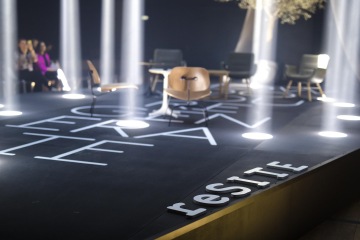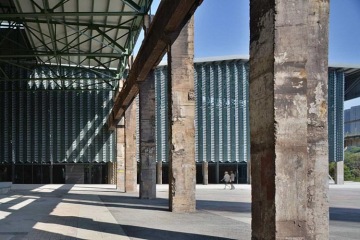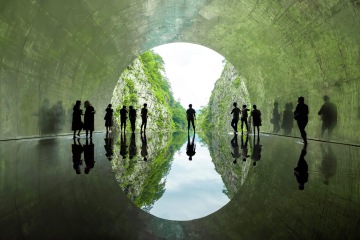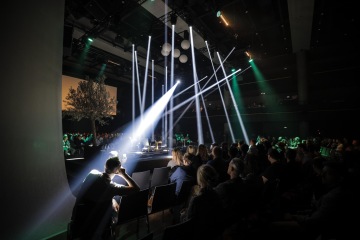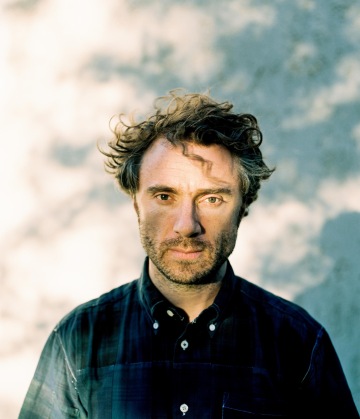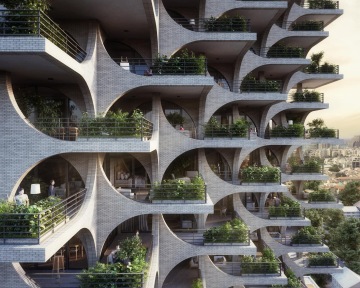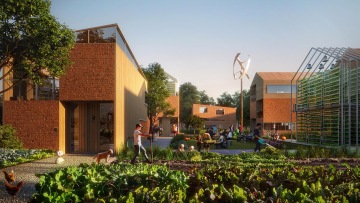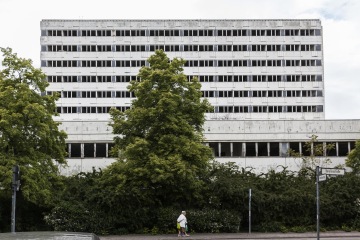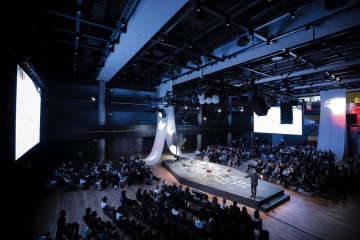
reSITE 2019 REGENERATE: Human Creativity is the Ultimate Renewable Energy
In its most diverse edition yet, REGENERATE hosted a rich and interdisciplinary conversation about the future of life in cities, attracting twelve hundred participants from 25 countries to 3 stages, side events and parties.
"Regeneration is a continuum. It has to be mindful. And we need to utilize the collective power."
reSITE founder, Martin Barry kicked off the the 8th edition of reSITE centered on the theme of regeneration. The discussion tackled natural and urban revitalization, our collective power and responsibility as individuals and institutions to organize and solve the problems of climate change and housing affordability, among many. Others discussed the need to regenerate our public spaces to push back against an all-consuming online world. Technology will also play a role in planning for uncertainty, they argued.
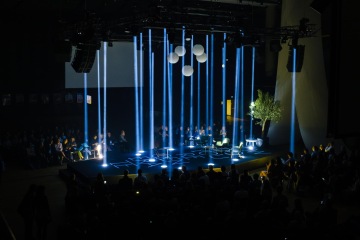
When it comes to cities, the whole of urban life is greater than the sum of its parts. As TechReset Canada’s Bianca Wylie noted, in the original translation of the phrase, the sum is also different than the whole of its parts.
Cities are the sum of designers, developers, artists, citizens, public officials, entrepreneurs, and the displaced, but rarely do each of these constituencies gather in the same room or even speak the same language, and cities suffer for it, but reSITE is literally that room, Greg Lindsay noted—the event that frames the future of cities through all of these perspectives and convenes them in one place.
Against the backdrop of the climate crisis, and the 20th of September Global Climate Strike, Wylie and her fellow speakers called on attendees to remember the collective power we possess as citizens, setting a tone that reverberated throughout the conference.
So, what will be remembered from reSITE 2019 REGENERATE?
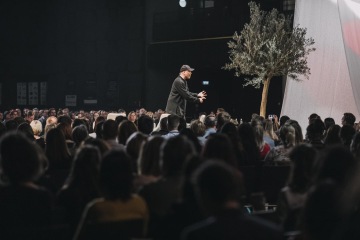
Ravi Naidoo, the founder of Design Indaba, has magnetized South Africa as a new hub for fresh aesthetics with what is now the largest design festival on the planet. It was only fitting that we kicked the conference off as he asked us all to look introspectively with the question: "What’s design for? Is it in service for people? Give it a higher purpose and a more noble service. Not just for consumption, but to improve the quality of life, not just for the haves, but the have-nots”.
Human creativity is the ultimate renewable energy.
Making the case that human creativity is the ultimate renewable energy and underlining the importance of technology for regeneration: "In the last century, it was enough to be literate, now you have to be techno-literate.“ and finally reminding us of the immense energy created in all of us coming together, coalescing and making it a force for good.
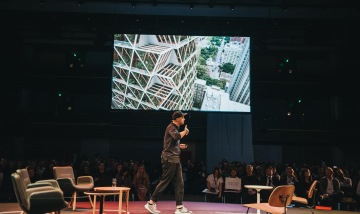
Our generation asks what is possible and not what is profitable.
Chris Precht, co-founder of Studio Precht, expressed the voice of his generation. He said that this generation of architects isn’t concerned with theory or concepts. “We’re concerned with the environment, with climate change, with sustainability. Our planet doesn’t care about fictional stories. Today we should build not for fictional stories but for our objective reality.” His practice creates spaces that connect with our senses. We can smell, taste and eat part of our buildings. It creates different city centers, not defined by banks and corporations, but health and vitality.

I want to remind you that you all have power. And you need to start using it. Now.
Bianca Wylie, co-founder of TechReset Canada has risen to notoriety through her criticisms of Sidewalk Labs and technology companies involvement in public spaces, arguing that they should not be commoditized. She reminded us all “that participating in all of these spaces very thoughtfully” is of great importance, and to not forget to act collectively: “I want to remind you that you all have power. And you need to start using it. Now. While it’s great to highlight the individual stories and projects, we also need to remember the power and the urgency of the need to operate as a collective.”
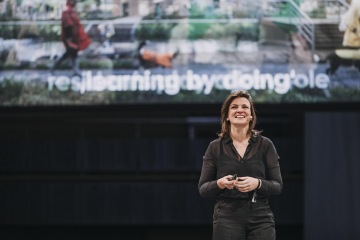
With a productive landscape, we can create a local economy.
Flipping the coin, Marianthi Tatari, UNStudio brought us their practice’s work on the Netherland’s Brainport Smart District, that aims at becoming the smartest neighborhood in the world. She stated that it's high time for the built environment to catch up with technology - our only tool helping to plan for the uncertainty of the future.
She makes the point that “with a productive landscape, we can create a local economy” as well as “the most important part is the human approach and care for the quality of life for every resident”, both being cornerstones for their smart city project taking the data ownership of its residents seriously.
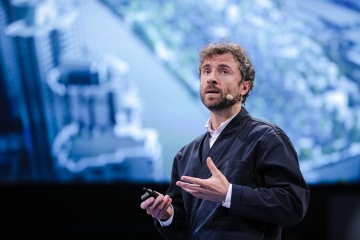
Make something that doesn’t feel like somewhere else that we’ve been.
Closing out the first day, Thomas Heatherwick (Heatherwick Studio) disclosed a new project to be built in Prague, the regeneration of Savarin complex adjacent to Wenceslas square . He insisted that we should "keep old buildings and work around them. The blessing of old building is their texture and soulfulness. The places we love tend to be multi-layered. He explained that his approach is to "make something that doesn’t feel like somewhere else that we’ve been.“
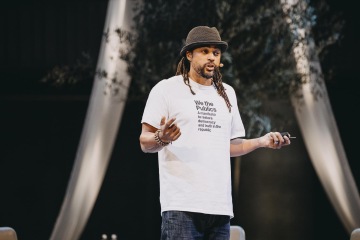
Every community has seeds of their own regeneration, right there.
Hailing from the south-side of Chicago, USA, founder of the Sweetwater Foundation and now-winner of the 2019 MacArthur Genius award, Emmanuel Pratt showcased all the ways in which they work with marginalized communities, putting them in the driverseat of the regenerating their communities.
“Every community has seeds of their own regeneration, right there”, and “regenerating is an active process, not a passing like sustainability. Giving people a chance to participate as well as ownership of that regeneration that translates into more than just physical spaces, but regenerates the culture.” are just a few statements that reflect his ethos.
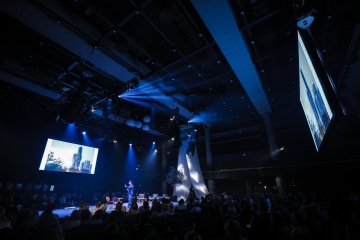
How can we trigger an emotional connection to architecture?
MAD Architects principal partner, Yosuke Hayano opened day two of REGENERATE with a presentation exploring the questions - “How can we trigger an emotional connection to architecture? How can we make architecture to be urban space so that people feel it is built for them? Through their design, MAD Architects seek to make a journey for people to meet nature in another way. They care about how the future of the city can be better pressed for the people, from young to old, to come, live and enjoy the space together.
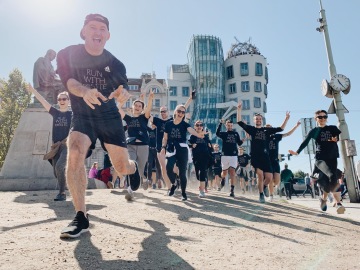
What is an urbanism conference if you don't get out and be in the city?
This year at REGENERATE, we are stepped up our game to bring you new ways to interact with speakers, and each other at this years event. reSITE has always been about connection, so we created a program to foster a little more of that, with more breakout sessions, the live mic stage powered by Shared Cities Creative Momentum, morning yoga, parties and ended with a guided run through the city.
Spotted on reSITE Social Networks
We are very excited to announce that Design Indaba founder @ravinaidoo will be speaking at @reSITE_ 's flagship global forum this Thursday in Prague.
— Design Indaba (@designindaba) September 17, 2019
#reSITE2019 #REGENERATE pic.twitter.com/hIa4mxtm8t
So what can we do?
— Roman Meliška (@happy_roman) September 19, 2019
How do we utilize our knowledge?@reSITE_ founder Martin Barry in the opening keynote of the 2019 #REGENERATE
“Creativity is the ultimate renewable source of energy.” | @ravinaidoo in a captivating #reSITE2019 keynote. @designindaba @reSITE_
— Roman Meliška (@happy_roman) September 19, 2019
Bianca Wylie, Co-founder of Tech Reset #Canada, explains what is “smart cities” for? at the @reSITE_ stage for #REGENERATE and talks about a new project of Sidewalk Labs - a mass timber city in #toronto pic.twitter.com/YTDUGbbE5y
— World Architecture (@WACommunity) September 19, 2019
@reSITE_ chris precht “architects feel sometimes undervalued [...] they are wearing black as an emotional statement” ????
— Barbora (@Barbora_Mickova) September 19, 2019
Very interesting discussion today at @reSITE_ in Prague today on the promotional power beautiful renderings can have to push through developments that may be ethically suspect. https://t.co/NXXsIDVNmx
— Feargus O'Sullivan (@FeargusOSull) September 19, 2019
.@biancawylie lives up to her moniker as the "Jane Jacobs of smart cities" with a cri de coeur to #REGENERATE faith in our city governments before they are replaced by corporations. Can't wait until she goes head-to-head with #ThomasHeatherwick this afternoon. #reSITE2019 https://t.co/NDu08vmGVO
— Greg Lindsay (@Greg_Lindsay) September 19, 2019
Just finished my presentation on McMansions at #reSITE2019! Thank you to the folks at reSITE for inviting me to share the architectural horrors of American wealth on the international stage!
— bespoke take peddler ???????? (@mcmansionhell) September 20, 2019
The looming questions mentioned today by Adrás Szánto at #reSITE2019 when talking about art and urban development????@reSITE_ pic.twitter.com/SXf0LT3m8t
— Marie Hornakova (@Maruska02) September 20, 2019
It was a pleasure to be a part of @reSITE_ conference and several discussions with the Prague mayor @ZdenekHrib last week. Thank you for inspiration!#prague #visit #resite2019 #urbanism pic.twitter.com/aM8kryeEIs
— Matus Vallo (@matusvallo) September 23, 2019
Read more ideas from reSITE 2019 REGENERATE
Eight Quotes Stuck in Our Minds From reSITE 2019 REGENERATE
Here are some of our favorite quotes we still have stuck in our heads from the 8th annual event keeping us inspired - and mindful - in how we go forth in designing and developing for future generations.
Jee Liu on Applying Subtle Design to Adaptive Reuse
At the core of WallaceLiu’s projects is a design practice called adaptive reuse. In the age of the quest for sustainability, adaptive reuse is becoming more of a necessity for city-makers worldwide.
Yosuke Hayano on How Architecture Can Create Emotional Connections to Nature
Principal architect for MAD Architects, Yosuke Hayano says the studio strives to connect architecture to nature through the creation of emotional and spiritual spaces for everyday life.
Let's REGENERATE our Future Cities at reSITE 2019
reSITE 2019 REGENERATE brings a global community of city-makers to Prague full of eagerness to inspire to create an impact on the future of our cities this September 19-20
Listen to reSITE's Podcast: Design and the City
Designing on a Human Scale with Thomas Heatherwick
Thomas Heatherwick’s holistic approach brings a thoughtful dimension to architecture, design and urban spaces. Listen to the acclaimed designer along with ArchDaily editor, Christele Harrouk, as they explore how he approaches projects by considering them from a human scale.
A New Generation of Architects with Chris Precht
Chris Precht’s aim to reconnect our lives to our food production by bringing it back into our cities and our minds can be found throughout his architecture. Listen as he discusses the importance of authenticity, creating spaces that activate our senses, and looking at our objective reality to solve the problems of our time.
Human-Centered Smart Cities with Marianthi Tatari
Associate Director and Senior Architect at UNStudio, Marianthi Tatari, dissects different aspects of city-making that threaten the quality of life such as mono-functional spaces and commoditized smart cities and how to approach designing them with optimism. Photo courtesy of UNStudio
Fighting Gentrification, Berlin-Style with Leona Lynen
A vast, unoccupied administration building in the heart of Berlin at Alexanderplatz - Haus der Statistik - has become a prototype for gentrification done right. Hear from Leona, a member of the cooperative, ZUsammenKUNFT, as she discusses how they are developing a mixed-use urban space oriented towards the common good. Photo courtesy of Nils Koenning
